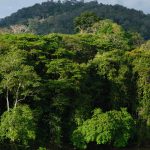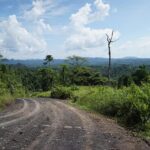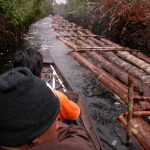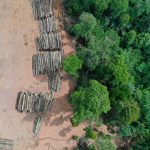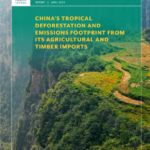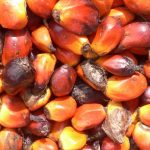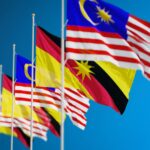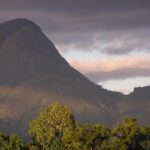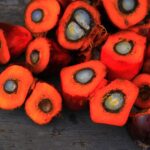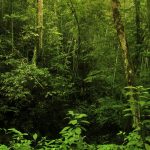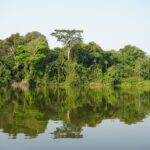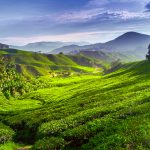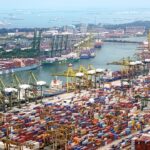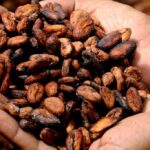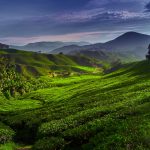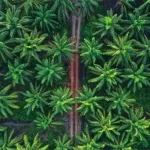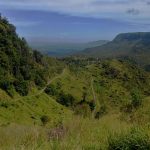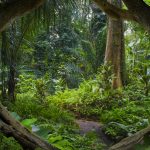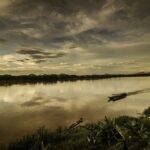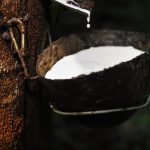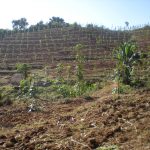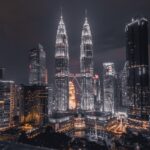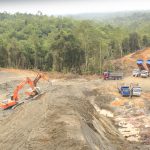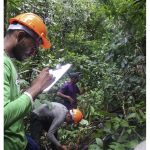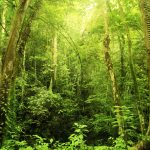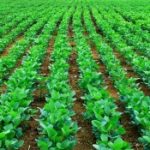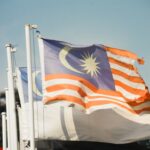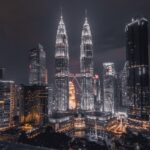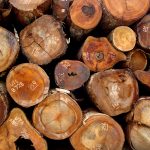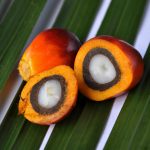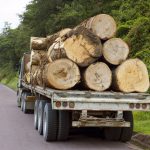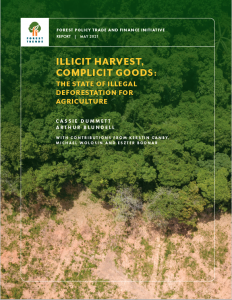
Five men were caught smuggling five truckloads of illegal logs in the Malaysian state of Sarawak.
According to the Sarawak Tribune, the Forest Department of Sarawak discovered the illegal logs during a routine raid in the Bintulu area on April 25. They found five trucks full of various species and sizes.
Recent data shows that Chinese banks have become the largest creditors to “forest-risk”* companies, after major producing countries Brazil and Indonesia, with over $23 billion in financing provided from 2018 to 2024.
Key Chinese banks, including CITIC, Industrial and Commercial Bank of China and Bank of China, are among the top creditors for “forest-risk” companies such as Royal Golden Eagle Group, which has faced repeated allegations that its supply chain has driven deforestation.
The increasing flow of finance to “forest-risk” companies undermines China’s climate and environmental goals under the Glasgow Leaders’ Declaration and national Green Finance Guidelines.
Meanwhile, Chinese banks rank poorly compared to their international counterparts in terms of deforestation-related policies, with four out of six major Chinese lenders scoring zero in the Forest 500 annual policy assessment.
A series of crackdowns on unlicensed timber factories by the General Operations Force (GOF) on the east coast has led to the arrest of 98 individuals and the seizure of various items worth RM97 million this year.
Various wood-processing and cutting equipment, including chainsaws, heavy machinery, and logs, were seized. Some factory owners were fined for operating without a licence, using unauthorised machinery and equipment, and violating timber-related regulations.
This article summarizes responses to FSC’s decision regarding Samling’s certification.
Samling manages more than 1.2 million hectares of forest land and about 190,000 hectares of gross forest plantations across Malaysia and carries PEFC and FSC certification in international markets. Listed on the Forest 500, the company is a significant player in the global plywood market and has property development interests in Southeast Asia, China, Russia and the USA.
Sabah Umno information chief Datuk Suhaimi Nasir said that the state government announcement that it generated RM5.3 billion in timber royalties since 1999 was frustrating Sabahans, who wonder why the state has failed to resolve its long-standing infrastructural challenges affecting them daily.
Last weekend, chief minister Datuk Seri Hajiji Noor announced that Sabah has collected royalties totalling RM5.3 billion from timber harvests from 1999 to 2023, translating to an average annual revenue of about RM213 million for the state government. The department also reported a revenue increase of RM16 million from timber royalties, totalling RM171 million in 2024.
Residents of Kampung Long Tepen in Baram are protesting alleged illegal logging by a company in an area they claim falls within their Native Customary Rights (NCR) land.
In a statement today, the village’s action committee accused the company of trespassing and violating their rights, as well as claimed that the Long Tepen community never agreed to allow logging in the area.
“Facing the Bulldozers: Iban Indigenous Resistance to the Timber Industry in Sarawak, Malaysia,” a report by Human Rights Watch, details how Sarawak state has failed to protect an Indigenous community from a timber company that logged without the community’s consent and seeks to remove them from their land, Human Rights Watch said in a report released today. Similar rights abuses throughout Sarawak underscore the need for the government to regulate businesses and for international buyers of Malaysian wood products – including the European Union, the United States, and Japan – to enforce sustainability laws for timber imports.
Malaysia’s Sarawak state has come under international criticism following the release of a Human Rights Watch (HRW) report detailing failures to protect an Indigenous Iban community from unauthorised logging and land encroachment.
The 60-page report, released on 5 May 2025, outlines how the company Zedtee, part of the Shin Yang Group, logged ancestral lands belonging to the Iban community of Rumah Jeffery without their consent. The report underscores that Zedtee’s actions violated local laws and sustainability certification rules.
Despite the violations, the Sarawak government did not take action against the company. Instead, authorities threatened to arrest Indigenous protesters and demolish their homes.
According to HRW, such conduct violates both Malaysian law and international standards.
China’s strong domestic forest conservation policies have ensured its national forests are making a major contribution to global afforestation and reforestation efforts, as well as internal climate goals. However, there has been no official mention of emissions and deforestation linked to China’s timber and agricultural imports (known as “embedded emissions”). This is despite China being the world’s primary or second main importer of the three main commodities (soy, beef, and palm oil) driving tropical deforestation, much of it illegal.
This report assesses China’s embedded tropical deforestation and emissions footprint linked to its agricultural and plantation forestry imports. These calculations are based on a major global analysis and database of deforestation and carbon emission impacts of the international trade in agricultural and timber products, augmented by Forest Trends’ (2021) analysis of the extent and nature of illegal tropical deforestation.
FSC has decided to maintain association with Samling Global Limited, provided they fulfil conditions to verify and address potential environmental and social harms caused in their forest operations. This decision is based on the recommendation of a decision panel of independent experts who assessed available evidence related to the Policy for Association (PfA) case against Samling.
The decision panel concluded that illegal logging and destruction of high conservation values (HCVs) occurred within a national park adjacent to one of Samling’s concessions in Sarawak, Malaysia. The panel also highlighted the risk of further violations that may have occurred in Samling managed forest areas in the past.
Based on the decision panel’s recommendations, FSC set the completion of a verified remedy process as a condition to maintain association with Samling. This provides an incentive for remedy, compared to disassociating from Samling Global Limited and expelling its entire corporate group from the FSC system.
Samling is required to implement FSC’s Remedy Framework (FSC-PRO-01-007) to verify and address the potential social and environmental harms caused in its forestry operations since becoming FSC-certified in 2009.
Plantation and Commodities Minister Datuk Seri Johari Abdul Ghani highlighted the strong performance of the country’s palm oil industry in 2024. This growth was driven by higher demand from developing regions such as Africa and South and Central Asia, as well as Indonesia’s biodiesel mandate, which now diverts 25% of the nation’s 48 million-tonne CPO output into biofuel production.
The government is ramping up financial assistance and tax incentives to encourage growers to replant with high-quality seedlings, ensuring continued productivity without expanding land use.
The Centre for Environment Protection and Rural Development (CEPARD) has strongly condemned the reckless destruction of forests, calling it a crisis that extends beyond environmental harm.
The ITTO has released the 2025 scores for its Global Timber Index. The GTI s a survey in nine pilot countries that covers timber harvesting, trade, and manufacturing, including production, orders, imports and exports, employees, inventory, raw material prices, and other business indicators. A GTI index reading above 50 per cent indicates the industry prosperity is generally expanding, while below 50 per cent indicates that it is generally declining.
Other news in the report includes:
- Thailand’s Commerce Ministry announced the simplification of export procedures for the export of Thai wooden products. Except for Siamese Rosewood, which remains banned from export, companies are no longer required to obtain a permit to export these wooden products.
- On sustainable forest management, the report said Brazil’s National Biodiversity Commission established national biodiversity targets for the period 2025-2030, including a target of achieving zero deforestation in the country.
The global agarwood trade heavily depends on wild-harvested endangered tree species, despite international regulations for protection, with significant volumes going undocumented in official trade records, a new study reveals.
About 70% of the trade depend on Aquilaria filaria and Aquilaria malaccensis, both threatened species, sourced from the wild, raising major sustainability concerns. Meanwhile, there are some tree species that are not even covered by CITES, the global wildlife trade convention.
Due to discrepancies between CITES and customs data, along with weak enforcement and outdated regulations, researchers suggest the illegal trade is far larger than reported.
Researchers urge stronger monitoring, updated data, expanded species protection, and a shift to cultivated sources. They also call on consumers and wealthy importers to support conservation and governments to promote sustainable practices.
The Malaysian Sustainable Palm Oil Standard MS2530:2022 (MSPO 2.0) officially comes into effect on Wednesday, introducing stricter guidelines for sustainability, traceability, and ethical practices in palm oil production.
Judge Lisa W Wang from the US Court of International Trade found that Chinese traders are using Malaysia to circumvent antidumping and countervailing duties on wooden furniture, vanities and components.
Judge Wang’s opinion comes after the US Department of Commerce – in July – upheld a ruling confirming that products coming from Malaysia and Vietnam entering the US must be covered by an antidumping and countervailing duty (or AD/CVD), with the department now looking to introduce a new certification regime to ensure compliance with rulings.
The Sabah Forestry Department has issued a furious press statement claiming as “false” Sarawak Report’s article detailing how logs have continued to be extracted from the Sabah Forest Industries (SFI) licence area, despite a court order that this should immediately cease on November 8th.
Also reported on here: Sabah dept to file report over illegal logging claim by whistleblower site | FMT
There has been a long-running dispute in the area that has impacted terribly on the inhabitants of Sipitang who had settled as employees of the previous Sabah Forest Industries (SFI) which became insolvent. Buyers have since sought, with the assistance of the GRS state government, to flush out the timber without paying the proper dues, according to the receivers of the company, and in the process the dependent communities of former staff have been cut off from financial support as well as services such as electricity and water.
On November 8th the Court of Appeal granted a stay to the SFI receivers who have been seeking a just settlement in the face of a compulsory acquisition of the area by the state government in the name of the ‘public interest’ when there wasn’t one.
alaysia’s harvesting volume in the timber industry has decreased significantly for three consecutive months in October 2024.
This is due to weak domestic and international demand as well as unfavourable weather, according to Global Timber Index (GTI) Producers Report for October.
“In addition, the Malaysian government has imposed restrictions on harvesting in order to fulfil its commitment to forest conservation, which also contributed to the decline in harvesting,” said the report.
Sabah is preparing to enhance its timber legality assurance system and fully integrate EUDR requirements by February 2025.
Under Rudolph Merab’s leadership, the Forestry Development Authority (FDA) approved the export of 797 logs, valued at US$923,441, despite knowing that over half of the timber was illegally harvested. This shipment, owned by West Water Group (Liberia) Inc., and transported by a ship flying under the Malaysian flag,was one of Merab’s first actions after his February appointment. The logs were bound for China, with Wenzhou Timber Group Co. Ltd purchasing them. Merab had a controversial history, with his logging companies previously found guilty of illegal activities, and ties to former President Charles Taylor. Merab was accused of exploiting Liberia’s forests to finance Taylor’s war.
The NGO Human Right Watch has, in collaboration with other international organisations, today issued a devastating report on Sarawak’s timber industry as it urges the European Union to categorise all Sarawak products as “High Risk” in advance of new laws to counter deforestation.
The critique follows on the heels of last week’s arrest of illegal immigrants found working for Borneoland Timber Resources in Baram, after both the Sarawak Forest Department and Malaysian Chief Executive of the International Tropical Timber Organisation had for months ignored complaints of logging by the crony company in the Suling Sela’an Protected Forest area.
This article alleges that Sarawak’s timber tycoon Hii family has been hiring illegal Indonesian workers to conduct logging operations in the internationally protected area of Ba Data Bila in the Baram region which the Sarawak Forestry Department has denied were taking place.
As of June 2024, there were 6.73 million ha. of MTCSPEFC certified forests in 36 certified natural forest units (FMUs) and nine certified forest plantations (FPMUs). There were 362 companies holding MTCS-PEFC certificates for Chain of Custody. MTCC statistics show that in 2023
Japan maintained its position as the leading importer of timber products certified under MTCS, totaling 102,630 cu m. followed by the Netherlands with United Kingdom, Australia, Belgium and France among the top importers.
Total exports increased by 7.4 % from 244,946 cu m in 2022 to 264,240 cu m in 2023 with plywood, sawnwood and mouldings remaining the major exported certified products. MIS_16-31_July2024.pdf (itto.int)
The United States government is cracking down on the swell of wooden cabinets, vanities, and components (otherwise known as WCV) entering American ports from Malaysia and Vietnam (via China).
Last week, the Department of Commerce upheld a preliminary ruling, confirming that WCV products entering the United States must be covered by an antidumping and countervailing duty (or AD/CVD) – with the department looking to introduce a new certification regime to ensure compliance with rulings.
The US Department of Commerce has upheld its preliminary determinations on the scope of antidumping and countervailing duty orders on imports of wooden cabinets, vanities and components (“WCV”).
Commerce will impose a new certification process where both importers and exporters will be required to certify that each shipment of WCV from Malaysia and Vietnam does not contain finished and/or unfinished Chinese cabinet components, including the doors, drawer faces, and frames. Certifications must be signed for every shipment of WCV from Malaysia and Vietnam to the United States. In addition, documents supporting the certifications must be retained for five years from the date of importation.
This Fern Op-Ed argues that the traceability requirement at the heart of the E.U.’s new deforestation law can also help lift smallholder farmers around the world out of poverty.
For example, in Côte d’Ivoire, farmers’ organisations say they support the Regulation because it could help push their government to complete the national cocoa traceability system — which they have been demanding for many years, as a means of ridding the local cocoa sector of corruption. This corruption blights the lives of smallholders, who are regularly forced to sell below the government-set price, with multiple local middlemen taking cuts along the way.
Sabah’s timber industry is to update its sustainability procedures to match with the requirements set out in the EUDR. This comes after the Sabah Forestry Department and the EU launched a partnership to update the Sabah TLAS. Over the past decade the Sabah TLAS gained acceptance in key timber trade markets including Europe, Australia, the United States, Japan and South Korea. The TLAS updating exercise will involve alignment of the Sabah TLAS with the EUDR. In addition to EUDR the Sabah TLAS will also align with the EU Corporate Sustainability Due Diligence Directive (CS3D). The updating exercise will involve a series of consultations and workshops with government agencies of the Implementing Agencies Coordination Committee (IACC), the Sabah Timber Industries Association (STIA), the Timber Association of Sabah (TAS) and timber companies. See: https://www.theborneopost.com/2024/06/19/sabah-forestryeu-launch-groundbreakingpartnership/#:~:text=KOTA%20KINABALU%20(June%2019)% 3A,Legality%20Assurance%20System%20(TLAS)%20to
The Sabah Forestry Department and the European Union have unveiled a partnership to update the Sabah Timber Legality Assurance System (TLAS), which will enable Sabah timber to be harvested in line with EU market requirements.
Malaysia is at risk of losing 16% of its remaining forest cover, with government concessions for timber and palm oil threaten the country’s COP26 commitment to maintain 50% of forest and tree cover. That is according to the environmental watchdog Rimbawatch, which has been vocal about Malaysia’s lack of transparency around forestry and land use data.
Now, its latest publication, the State of Malaysian Rainforests for 2024, reports that based on its own definition of deforestation, forests at-risk have increased from 2.3 million hectares in 2023 to 3.2 million hectares.
Original report here: a4715a_ad144495d1fa46bf857166bda8e2e8a9.pdf (filesusr.com)
Under the Malaysian Constitution, forestry is under State jurisdiction. The National Forestry Act coordinates forestry matters nationally and recently amendments to the Act were passed. Among the key changes were the tightening of the degazetting and replacement process for permanent forest reserves, the introduction of a public investigation process before the degazetting of any forest reserve and the simultaneous replacement of the degazetted forest. 5 ITTO TTM Report: 28:9 1 – 15 May 2024 The Natural Resources and Environmental Sustainability Minister, Nik Nazmi Nik Ahmad, urged State governments to adopt the amendments as, so far, only Perlis and Selangor States have fully adopted the amendments.
Over three million tons of West African Rosewood have been shipped to China since 2017. The logs are manufactured into high-end Chinese furniture and exported worldwide as part of a multi-billion dollar furniture industry.
In November, Wood Central reported that CITES had banned the felling, transportation, and exportation of West African Rosewood in response to Chinese traders’ “industrial-scale” exploitation of the timbers. That move, according to environmental watchdog forest-trends, is an acknowledgment that past measures to protect the species, known as P. erinaceus, have “not worked and that CITES Parties (who are responsible for the measures to verify the legality and sustainability of trade, have not been able to eradicate illegal trade alone.”
Now, a new report by the Environmental Investigation Agency alleges that the multi-billion dollar trade is showing no signs of slowing, despite CITES and the Gambian government’s both introducing outright bans on the harvest and distribution of the timbers.
The Dayak Oil Palm Planters Association (DOPPA) based in Sarawak, Malaysia is urging indigenous farmers to stand up for their rights to self-govern their ancestral lands and demand exception from the European Union’s Deforestation Regulations (EUDR).
As Malaysia seeks to certify 100% of its palm oil production under the Malaysian Sustainable Palm Oil (MSPO) certification scheme to meet EUDR requirements, some DOPPA members are facing the threat of exclusion from foreign markets due to the issue of indigenous land claims. Land title is a prerequisite for the MSPO which seeks acceptance by the EU, US and UK. DOPPA supports the MSPO and wants all members to be certified. However, land claims are a complex matter which cannot be resolved quickly to meet the requirements the MSPO or EUDR
The palm oil industry, notably in Indonesia and Malaysia, the world’s two largest producers, faces challenges from claimed environmentally friendly substitutes. C16 Bioscience, a US-based company, has been developing palm oil substitutes since 2017 with Bill Gates, the founder of Microsoft, among its investors.
On its website, C16 promotes Palmless by emphasising palm oil’s environmental harm. It doubts the efficacy of the Roundtable on Sustainable Palm Oil (RSPO) certification, as certified palm oil is often mixed with non-certified palm oil, hindering source traceability despite RSPO criteria against primary forest clearance or biodiversity-rich areas.
Now, C16 is leveraging the EUDR to expand the utilisation of Palmless. The company recommends that downstream producers diversify their supply chains by using palm oil alternatives like Palmless, which falls outside the scope of the EUDR.
Bloomberg reports on the growth of palm oil production in Latin America where new, highly traceable supply chains are being established as traditional palm oil giants Malaysia and Indonesia have run out of land for further expansion without deforestation.
All nations have some unmapped or unofficial roads, but the situation is especially bad in biodiversity-rich developing nations, where roads are proliferating at the fastest pace in human history.
When ghost roads appear, local deforestation soars—usually immediately after the roads are built. We found the density of roads was by far the most important predictor of forest loss, outstripping 38 other variables.
Also reported here: Scientists find vast numbers of illegal ‘ghost roads’ used to crack open pristine rainforest (phys.org)
The overall rate of primary forest loss across the tropics remained stubbornly high in 2023, putting the world well off track from its net-zero deforestation target by 2030, according to a new report from the World Resources Institute.
The few bright spots were Brazil and Colombia, where changes in political leadership helped drive down deforestation rates in the Amazon.
Elsewhere, however, several countries hit record-high rates of forest loss, including the Democratic Republic of Congo, Bolivia and Laos, driven largely by agriculture, mining and fires.
Sarawak has reduced its timber harvesting operations to approximately two million cubic metres per year to balance the need for environmental conservation and economic considerations, said Hamden Mohammad the Sarawak Forest Department Director. He added that requirements on forest management certification apply to both natural and planted forests. “We currently have 25 certified natural forests covering over 2.2 million hectares as well as seven certified forest plantations covering approximately 97,000 hectares” he told participants at the opening ceremony of the Conference.
This report by Global Witness shows how the 20 biggest banks in the EU have provided billions to companies linked to deforestation since 2016. This review shows that voluntary guidelines and individual commitments by financial institutions are unlikely to stop the financing of forest destruction.
When Russia invaded Ukraine in February 2022, sanctions swiftly followed, including a total ban on Russian timber imports into the European Union (EU) from July 2022. Belgium, one of the staunched supports of the EU ban, has become a profitable destination for Russian wood. Using a forensic laboratory at the Royal Museum for Central Africa in Tervuren, inspectors determined that several wood shipments from Russia had arrived in Belgium. The number of fines imposed for illegal harvests almost tripled in 2023.
“But an impediment is a distinct lack of inspectors,” Wynant said. “There are now fewer than five timber inspectors working full-time in Belgium, but there are 4500 timber importers,”according to the article .
Malaysian Timber Certification Scheme is transitioning to the PEFC ST 2020 by 31 December 2023. Any certificates that have not fully transitioned by 1 January 2024 will automatically be updated to “expired” on the PEFC database. MTCC is working with PEFC to ensure MTCS-PEFC certified timber products originating in Malaysia comply with EUDR requirements. Also reported in ITTO MIS Jan 1-14 2024 https://www.itto.int/mis/
Southeast Asia has never been an easy place for activists, but a worrying trend emerged over the course of 2023 that saw environmental and Indigenous activists increasingly placed in the crosshairs of authoritarian governments as a result of their activism.
Mongabay presents a short summary of status of illegal logging and forest governance in SE Asia.
Wilmar International’s No Deforestation, No Peat, No Exploitation policy, announced ten years ago, marked a significant milestone in environmental conservation by prohibiting deforestation, peatland destruction, land-grabbing, and labor abuses in their global supply chain, impacting thousands of palm oil companies.
The policy, a result of global campaigning and intense negotiations, contributed to a dramatic reduction in deforestation for palm oil by over 90%, influencing other industries and contributing to the lowest deforestation levels in Indonesia, as well as progress in Malaysia, Papua New Guinea, and tropical Africa, argues Glenn Hurowitz, the Founder and CEO of Mighty Earth, who led the negotiation with Wilmar.
Hurowitz says this “success story” highlights the importance of private sector involvement, effective campaigning, diligent implementation, the necessity of continuous effort, and the insufficiency of data alone in driving change.
Malaysia and Indonesia want to bring other Southeast Asian countries on their side amid ongoing disputes with the European Union over environmental and deforestation regulations that are set to take effect in late 2024, with the two nations worried about the regulations’ impact on the region’s agriculture exports. Both Southeast Asian states have independently initiated complaints against the EU to the World Trade Organization (WTO).
Indonesia and Malaysia, which together account for around 85% of global palm oil production, argue that the EU Deforestation-Free Regulation is discriminatory and unfairly punishes small-scale farmers who will struggle to cope with the bureaucratic demands set by Brussels.
A joint collaboration among several key stakeholders has led to the significant combat of forest-related crimes such as illegal hunting and logging here.
State Assistant minister to Chief Minister Datuk Abidin Madingkir said Yayasan Sabah Group, Sabah Environmental Trust, Sabah Forestry Department, and the Sabah Wildlife Department signed a Memorandum of Understanding (MoU) in August, last year.
European Union rules aimed at stopping deforestation threaten widespread disruption for Southeast Asia’s rubber sector, from Cambodia’s 30,000 small farmers to major exporters in Thailand and Malaysia.
The concern for Southeast Asia, critics say, is that these requirements will disproportionately hurt small farmers while failing to adequately address rubber’s role in deforestation.
The deforestation caused by the rubber farming in Thailand and the world has been significantly underestimated, according to new findings from two scientific studies, with Southeast Asian rubber production potentially contributing up to three times more forest depletion than previously thought.
With over 4 million hectares of forest lost for rubber production since 1993, an area the size of Switzerland, “the effects of rubber on biodiversity and ecosystem services in Southeast Asia could be extensive,” according to a paper published on Wednesday in the journal Nature.
In Southeast Asia, mature rubber plantations covered 14.2 million hectares. Indonesia, Thailand, and Vietnam accounted for more than 70% of these plantations.
China, Malaysia, Myanmar, Cambodia, and Laos were also important rubber-producing countries. Rubber plantations that were closed down before 2021 were excluded from the analysis, despite the fact that they may have contributed to deforestation.
The total forest area of BRI countries represents 30.5% of the global forest area, with total forest product trade between the countries growing from US $48 billion in 2013 to US $72 billion in 2021. Often described as “the World’s Factory”, China produced 71% of the world’s manufactured plywood in 2020, and whilst that number has dropped, Wood Central understands that Chinese companies are investing in Malaysian and Indonesian plywood manufacturing.
As the world’s largest consumption market, it swallowed 18% of global demand and 71% of Asian demand for forest products. It has the highest reliance on imports – with the share of imported wood at 55%, including sawn timber, logs, pulp and paper.
A new report indicates that rubber-related forest loss has been substantially underestimated in policy, by the public and in recent reports. Direct remotely sensed observations show that deforestation for rubber is at least twofold to threefold higher than suggested by figures now widely used for setting policy
The role of community rangers is very important in efforts to combat encroachment, illegal logging and mining as well as the killing of wildlife, therefore increasing the number of rangers including from the Orang Asli community is described as the right decision.
Negotiations have begun between the world’s top two palm oil producers and the EU to address sticking points in a deforestation law that would make it harder for the commodity to enter European markets.
Indonesia and Malaysia account for 85% of global palm oil exports, and would be heavily impacted by the EU Deforestation-Free Regulation (EUDR), which prohibits imports into the EU of commodities sourced by clearing forests.
At the first joint meeting of an EU-Indonesia-Malaysia task force, delegates discussed risk designations for producer countries as well as the role of certification schemes like the RSPO to help meet EUDR requirements.
Indonesian officials say their main issue with the EUDR is that it discriminates against small farmers, who manage 41% of the total plantation area in the country and would have difficulty complying with the new regulation’s requirements.
A logging company owner and manager were charged in the Sessions Court with illegal logging and unlawfully possesing logs in Sipitang.
Company owner Yun Ket Chun, 48, and manager Tiong Chee Khong, 49, pleaded not guilty before judge Elsie Primus to the four charges today.
In the first and second counts, the duo was accused of felling trees without a permit or licence under the Forest Enactment 1968 between July 17, 2019 and Feb 4, 2020.
They cut down more than 700 trees in 2 forest reserves and state land. Fines and jail time are being requested. all the logs were seized by the Forestry Department and had been auctioned.
Last week, the Forest Stewardship Council (FSC) officially accepted a complaint against Malaysian timber giant Samling filed by civil society groups last October, The Borneo Project and Bruno Manser Fonds report.
The FSC accepted the complaint after determining there was “sufficient evidence” regarding violation of its policies. In an online statement last Wednesday, the FSC said it will open a case into alleged illegal logging, violations of traditional and human rights, destruction of high conservation value forests and significant conversion of forests as grounds for dissociation.
Recently it was announced that logging concessions in Sarawak can be extended for an additional 30 years when they are certified. The domestic press has reported one company, Ta Ann Holdings, secured approval from the Sarawak authorities to renew the licence of all its timber concessions for 30 years until 2053.
For the fourth time, the hearing of a defamation suit filed by Malaysia-based timber company Samling against Indigenous rights group SAVE Rivers has been delayed.
According to the statement of claim filed by Samling plaintiffs, the case hinges on eight articles published on SAVE Rivers’ website between June 2020 and March 2021 involving allegations of illegal logging and a rush to gain sustainable forestry certification, which Samling says is untrue.
Last month, 160 organizations signed a letter describing this suit as a strategic litigation against public participation, or SLAPP case, noting that the fine — plaintiffs are asking for 5 million ringgit ($1.1 million) — would bankrupt SAVE Rivers.
The deferment of the trial comes days after the Forest Stewardship Council, an international organization that operates a certification scheme for sustainable forestry, said the company will be investigated for alleged violations of the council’s policies.
The revelations mirror Deforestation Inc. findings from around the world, which showed how auditing firms hired as environmental verifiers often ignore or fail to identify serious transgressions by their clients.
Audit firms in Finland, Indonesia, Chile, India, and Germany are also mentioned.
Ta Ann Holdings Bhd has secured approval from the Sarawak authorities to renew the licence of all its timber concessions for 30 years until 2053.
has secured approval from the Sarawak authorities to renew the licence of all its timber concessions for 30 years until 2053.
The group’s timber concessions have been consolidated and amalgamated into three forest management units (FMUs) in the Song-Kapit region in central Sarawak, covering a total of 346,021 ha, according to executive chairman Datuk Amar Abdul Hamed Sepawi.
He said all the three FMUs – Kapit, Pasin and Raplex – have obtained the certificate for forest management (natural forest) under the Malaysian timber certification scheme (MTCS), which is endorsed by the programme for the endorsement of forest certification (PEFC).
Barclays has published new supply chain sustainability requirements for clients in forest-risk commodity sectors including beef and palm oil.
Barclay’s has added a new Forestry and Agricultural Commodities statement to its website this week. The statement stipulates that Barclays has “no appetite” to support companies directly involved in illegal forest clearance.
From the beginning of July, beef producers will not be able to undertake work in areas of the Amazon rainforest cleared or converted after 2008.
Those producing beef in South America will also need to prove that they gave deforestation-free supply chains by 2025. By the end of 2025, these firms will need to update their policy commitments on deforestation and human rights, and to monitor and report on deforestation-free product volumes.
Barclays (BARC.L) has told beef sector clients they must prevent deforestation in their South American supply chains, in a policy document seen by Reuters that toughens the bank’s stance but stops short of campaigners’ demands.
Plantation and commodities minister Fadillah Yusof slammed the European Union today for passing the EU Deforestation Regulation (EUDR), claiming that it was “unjust” to the palm oil industry in Malaysia.
Fadillah, who is also deputy prime minister, said the regulation was a deliberate effort to increase costs and erect barriers to the entry of Malaysia’s palm oil, which would affect over 450,000 smallholders in the industry.
Chairman for Law and Order, Edwin Maigen, called for the investigation, charging and harsh punishment of three Malaysians, whom he alleges are connected to logging companies operating in New Ireland. He accused Malaysian companies of monopolizingi the logging industry in PNG and harming the country’s people and infrastructure.
Acting Provincial Administrator and Forestry Enforcement Crime Unit Chairman Moses Taram expressed his concern about the incident and announced a crackdown on illegal activities at logging camps.
A task force comprising customs, immigration, police and labor will investigate logging camps to ensure that these companies operate within the legal limits.
In a study released this week titled “State of the Malaysian Rainforest 2023,” climate group RimbaWatch says it based its “landmark” deforestation prediction on a review of public documents such as forestry maps, project descriptions, land activity and real-estate alerts.
“From our analysis, we estimate that a further 2,346,601 hectares of forests in Malaysia have been earmarked for deforestation,” the study said.
“The study found that between 2017 and 2021, the entities driving deforestation projects the most were timber plantations at 41.6%, followed by palm oil plantations at 15.5%.”
Forestry authorities put timber and palm plantations under the categories of “forest plantations” and “forest covers,” the study said. But such plantations actually involve deforestation and “conversion of forest reserve lands into industrial monoculture plantations for commodities such as rubber and acacia.”
The state government has to double up efforts to focus on combating illegal logging activities in Sarawak, said Parti Keadilan Rakyat (PKR) national council member Abun Sui Anyit.
Abun was responding to Natural Resources, Environment and Climate Change Minister Nik Nazmi Nik Ahmad’s revelation in the Dewan Rakyat recently on the high number of illegal logging cases in Malaysia.
Nik Nazmi said out of the 90 cases last year, 60 were recorded in Sarawak, while Perak recorded the second highest number of cases at 11, followed by Kelantan with 10.
MALAYSIA’S timber export contributed RM23.25 billion to the country’s economy as of November last year, despite the drop in demand from Europe according to Malaysian Timber Industry Board’s (MTIB) report.
The country’s timber industry still has a few obstacles to overcome, mainly with the requirements in certification of the European Union Deforestation Regulation (EUDR) that may limit the export-ing of timber products into multiple markets.
JAKARTA, Feb 9 (Reuters) – Indonesia and Malaysia, the world’s biggest palm oil producers, plan to send envoys to the European Union to discuss the impact of the bloc’s new deforestation law on their palm oil sectors, ministers from the Southeast Asian countries said on Thursday.
KUANTAN: The Malaysian Anti-Corruption Commission (MACC) has detained a civil servant and a government retiree over bribe allegations linked to timber theft in forest reserve areas around Kuala Lipis.
The two male suspects were believed to have received bribes of between RM500 and RM2,000 from a company owner from November 2019 until 2020 to cover up the illegal activity, according to a source.
The first suspect, aged 40, was arrested at about 2.30pm today (Jan 5) at the Raub MACC branch office when he turned up to give his statement, while the second suspect, aged 61, was nabbed at 7pm yesterday (Jan 4).
- The Ulu Muda rainforest is one of the last large, continuous tracts of forest in the Malay Peninsula, providing vital habitat for countless species as well as water for millions of people in northern Malaysia.
- Satellite data indicate deforestation activities are intensifying in the greater Ulu Muda landscape, including in protected areas such as Ulu Muda Forest Reserve.
- Sources say the forest loss is likely due to legal logging.
- Conservationists worry that the loss of Ulu Muda rainforest will have detrimental impacts on the region’s biodiversity and water security, as well as contribute to global climate change.
Illegal logging activities are still rampant in almost all the states in Malaysia, Energy and Natural Resources Minister Datuk Seri Takiyuddin Hassan said today. However, he assured that the Forestry Departments of the affected states were closely monitoring the situation.
- Critics of a government plantation scheme have slammed the program following revelations that only a fraction of forest reserves cleared for plantations over the past decade have actually been replanted.
- An investigation by environmental news site Macaranga found that only 5% of the 77,331 hectares (191,089 acres) of forest reserves cleared in Pahang state for plantations between 2012 and 2020 were replanted.
- A Pahang state opposition lawmaker has called the program a “cover-up” for a logging scheme, while an environmental activist has criticized the government for its lack of accountability.
Culprits convicted of plundering, damaging or starting fires in the nation’s forest reserves will be punished with heavier fines and longer jail terms.
Illegal loggers, for instance, are looking at a minimum of five to 20 years in jail and fines of up to RM1mil if convicted.
Two logging companies were acquitted by the Sessions Court on a charge with conducting illegal logging in a forest reserve in Tongod from 2016 to 2017.
The Kelantan state government has admitted that illegal logging and encroaching occur in the state’s permanent forest reserves but it is not as serious when compared with other states.
“Illegal logging does occur (in Kelantan). There are villagers who want to open orchards, plant durian trees and oil palm, so they cut down trees in forest reserves,” Kelantan deputy menteri besar Nik Mohd Amar Nik Abdullah said.
Effective Jan. 3, the state of Sabah in Malaysian Borneo has ended a ban on exporting unprocessed logs.
The ban was put in place in 2018 in a bid to bolster the state’s timber processing industry; critics warn that overturning it will lead to an increase in both legal and illegal logging in the state’s remaining forests.
A Sabah DAP lawmaker has panned the government’s decision to lift the ban on timber exports, which has been in place since 2018.
Kota Kinabalu MP Chan Foong Hin said the move could trigger a recurrence of illegal logging activities, with little enforcement to prevent it from happening.
The Pahang state government has been urged by the opposition to conduct an immediate investigation on what was claimed to be illegal and uncontrolled logging in the state.
Guardian analysis of trade data has revealed that China received more than half the total tonnes of seafood, wood and minerals exported from the region in 2019, a haul worth $3.3bn that has been described by experts as “staggering in magnitude”.
The country’s mass extraction of resources comes as China has deepened its connections with governments across the region, amid a soft power push that sees it rivalling the influence of the US and Australia in the Pacific.
Click here to access the Global Illegal Logging and Associated Trade (ILAT) Risk assessment tool and to download the Forest Trends User Guide describing the functionality of the ILAT Risk Data Tool.
Click here to access the Cattle Data Tool.

